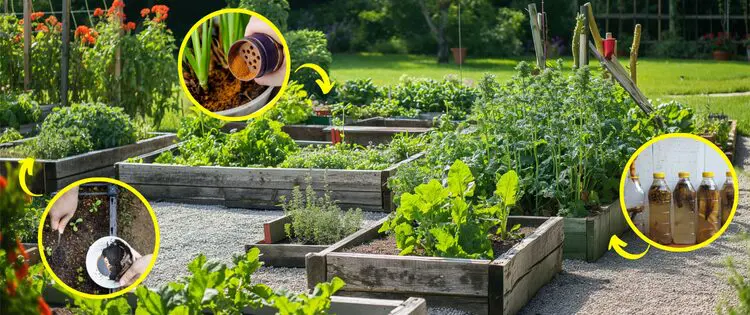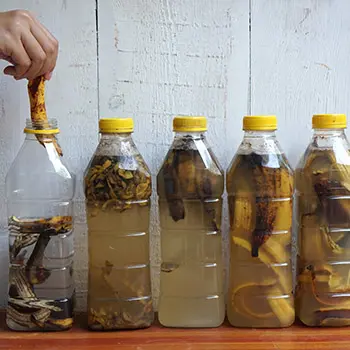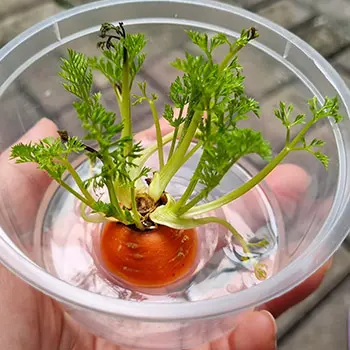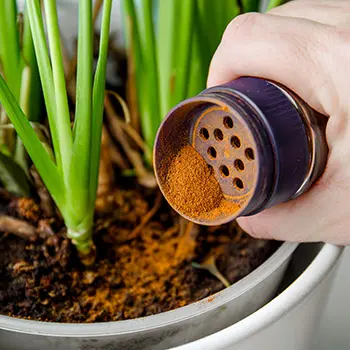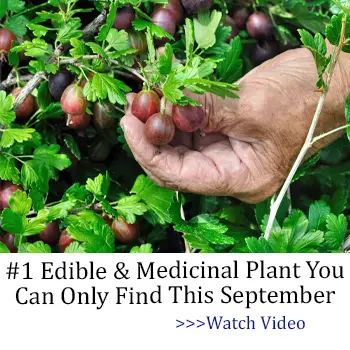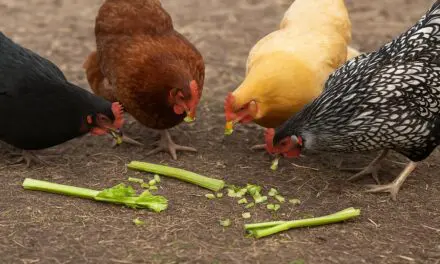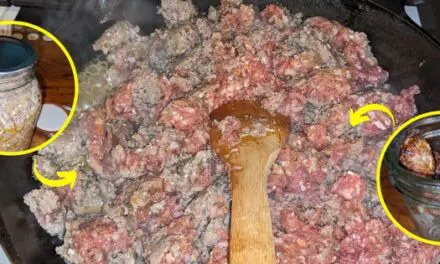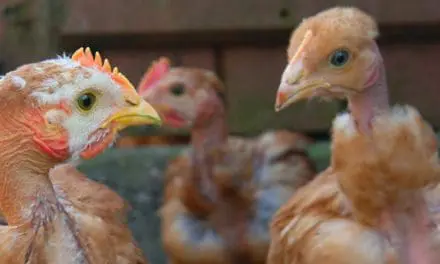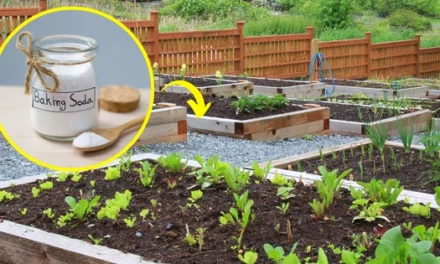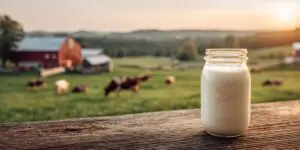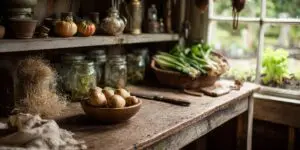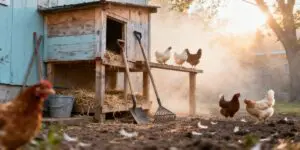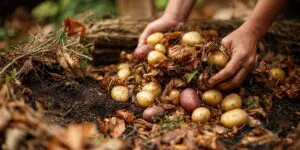Ever heard of regrowing veggies from scraps or using mesh bags to repel pests? These might sound like myths, but they’re surprisingly effective. So next time you come across a gardening “myth,” give it a shot—you might be surprised by the results.
Coffee Grounds Enrich Your Plants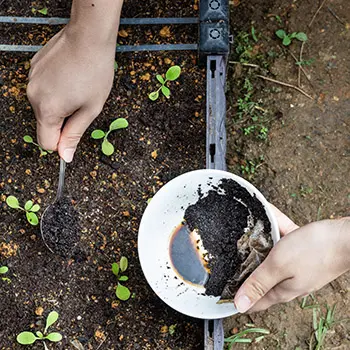
Coffee grounds are not just leftovers from your brew; they are a garden treasure. Rich in nitrogen, they are an excellent addition to your compost pile.
By mixing coffee grounds with “brown” materials like dried leaves, you speed up the composting process. This creates a rich compost that improves soil quality. Additionally, incorporating coffee grounds into the soil helps enhance its texture. They make the soil looser and more aerated, which is great for plant roots.
Although fresh coffee grounds are acidic, used ones are nearly neutral with a pH of around 6.5. This versatility means you can use them for a variety of plants without changing the soil pH significantly.
Using Mesh Bags to Keep Pests Away
Using mesh bags to protect plants from pests is indeed an effective, economical, and eco-friendly practice.
This method is especially appealing because it avoids chemical pesticides, which can harm friendly insects and become costly with frequent use. Mesh bags are a bargain, typically costing about $0.20 each, and they’re reusable. This makes them a smart, long-term investment for gardeners.
To use them, simply place the bags over flowers or vegetables. Make sure the drawstrings are tight for a secure fit. For instance, an 8″x10″ mesh bag can shield chard and similar large plants from grasshoppers and other insects.
Related: Easy DIY Garden Pest Killer You Can Make At Home
Besides insects, mesh bags can also prevent larger pests like squirrels, rabbits, and deer from harming young transplants and crops such as strawberries and apples.
However, it’s important to wait until pollination has finished before covering fruits or vegetables with mesh bags.
Banana Peel Juice Nourish the Plants
Many gardeners use banana peel juice to nourish their plants. This method involves soaking banana peels in water to extract nutrients and then using the liquid as a natural fertilizer.
Banana peels are rich in nutrients that benefit plant growth. They contain calcium, magnesium, sulfur, and phosphorus. These nutrients help plants thrive and develop strong roots and foliage. However, not all nutrients in banana peels are readily available through soaking. For instance, potassium requires soil microbes to break it down so plants can absorb it effectively.
While banana peel water can be a useful supplement, it shouldn’t replace commercial fertilizers entirely.
Spray Chamomile Tea to Strengthen Seedlings
Another practice that seems mythical but is quite effective is spraying chamomile tea to strengthen seedlings. Gardeners widely recommend this method to protect young plants from fungal diseases.
Chamomile tea contains natural antifungal compounds that help prevent common seedling diseases such as damping-off, caused by various fungal pathogens. These compounds create a protective barrier, inhibiting the growth of harmful fungi.
Moreover, chamomile tea is a non-toxic solution that doesn’t harm beneficial soil organisms or pollinators. Particularly beneficial for seedlings, chamomile tea can also be used on established plants to help prevent fungal issues without the risk of chemical buildup in the soil.
Vegetables from Food Scraps
It is true that you can grow new vegetables from food scraps, however, it requires some patience and knowledge.
Many vegetables can be regrown from scraps, including green onions, celery, romaine lettuce, garlic, and even mushrooms. This practice involves using leftover parts of fruits and vegetables to grow new plants.
The basic principle is simple. Items like green onions, garlic, and celery can regrow from their root ends. To start, place the white root ends in water and keep them in sunlight. Once the roots are established, transfer them to the soil.
Related: Vegetables You Can Re-Grow From Scraps
This method not only reduces food waste by reusing scraps but also decreases greenhouse gas emissions from decomposing organic waste. Moreover, it ensures you have access to fresh, organic produce right at home.
Different plants have different success rates when regrown from scraps. Herbs and certain vegetables like green onions and celery are easier to regrow compared to others like mushrooms and pineapples.
Using Cinnamon to Eliminate Fungus
It may seem like a myth, but using cinnamon to eliminate fungus is actually true. Cinnamon is a natural remedy gardeners often rely on to prevent fungal diseases in plants.
Cinnamon contains compounds such as cinnamaldehyde, cinnamic acid, and eugenol, which are responsible for its antifungal properties. These compounds inhibit the growth of fungi by disrupting cell membranes and interfering with enzyme activity.
Related: What Happens If You Sprinkle Cinnamon In Your Garden
Studies have shown that cinnamon essential oil is effective against a variety of plant pathogens, including Botrytis cinerea (grey mold), Fusarium oxysporum, and Rhizoctonia solani. This makes cinnamon a versatile tool for gardeners.
Cinnamon powder can be particularly useful in preventing damping-off disease in seedlings, a common fungal issue. To enhance the effectiveness, you can also combine cinnamon with other natural antifungal agents, such as chamomile tea.
Adding Weeds to Enhance Garden Soil
Now, this might sound like a myth that can’t be true, but adding weeds to your garden can actually enhance the soil. Weeds can bring nutrients from deep within the soil to the surface, making them available to other plants when they decompose.
Plants like dandelions and thistles have deep taproots that pull nutrients from lower soil layers. When these weeds decay, they release these nutrients into the soil, enriching it for other plants.
Moreover, weeds can improve soil structure by preventing erosion and increasing organic matter as they decay. Their roots create channels that improve water infiltration and root penetration for other plants.
Related: Weeds You Should Never Pull From Your Backyard
Certain weeds can indicate specific soil conditions, such as pH levels, compaction, and nutrient deficiencies. For example, plantain and sorrel indicate acidic soil, while chickweed suggests fertile soil.
Many gardening practices that seem like myths are actually beneficial truths. From using coffee grounds and mesh bags to enriching the soil and protecting plants, to regrowing vegetables from scraps, and even using cinnamon and weeds, these methods offer natural, cost-effective, and environmentally friendly solutions.
Transform your gardening game and watch your plants bloom like never before with these little hacks mentioned above now.
The Natural Painkiller that Grows in Your Backyard (Video)
How to Adjust the pH in Soil and Water for Abundant Harvests
Soil Testing Methods Used By Pioneers That Still Work Today
States That Will Punish You for Harvesting Rainwater. Do You Live In One Of Them?

